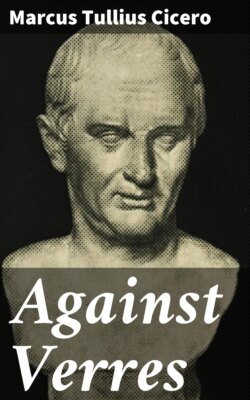Читать книгу Against Verres - Marcus Tullius Cicero - Страница 49
На сайте Литреса книга снята с продажи.
27
ОглавлениеTable of Contents
68The next morning men come early to the public assembly; they ask what is best to be done; every one delivered his own opinions to the people according as each individual had the most weight. No one was found whose opinion and speech was not to this purpose:—"That it need not be feared, if the Lampsacenes had avenged that man's atrocious wickedness by force and by the sword, that the senate and Roman people would have thought they ought to chastise their city. And if the lieutenants of the Roman people were to establish this law with respect to the allies, and to foreign nations,—that they were not to be allowed to preserve the chastity of their children unpolluted by their lusts, it was better to endure anything rather than to live in a state of such violence and bitterness." 69As all were of this opinion, and as every one spoke in this tenor, as his own feelings and indignation prompted each individual, all immediately proceeded towards the house where Verres was staying. They began to beat the door with stones, to attack it with weapons, to surround it with wood and faggots, and to apply fire to it. Then the Roman citizens who were dwelling as traders at Lampsacus run together to the spot; they entreat the citizens of Lampsacus to allow the name of the lieutenancy to have more weight with them than the insult of the lieutenant; they say that they were well aware that he was an infamous and wicked man, but as he had not accomplished what he had attempted, and as he was not going to be at Lampsacus any longer, their error in sparing a wicked man would be less than that of not sparing a lieutenant. 70And so that fellow, far more wicked and infamous than even the notorious Hadrian,[8] was a good deal more fortunate. He, because Roman citizens could not tolerate his avarice, was burnt alive at Utica in his own house; and that was thought to have happened to him so deservedly, that all men rejoiced, and no punishment was inflicted for the deed. This man, scorched indeed though he was by the fire made by our allies, yet escaped from those flames and that danger; and has not even yet been able to imagine what he had done, or what had happened to bring him into such great danger. For he cannot say:—"When I was trying to put down a sedition, when I was ordering corn, when I was collecting money for the soldiers, when in short I was doing something or other for the sake of the republic, because I gave some strict order, because I punished some one, because I threatened some one, all this happened." Even if he were to say so, still he ought not to be pardoned, if he seemed to have been brought into such great danger through issuing too savage commands to our allies.
